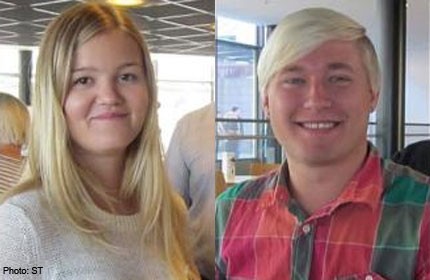Only Finland's best become teachers

Some top scholars in Singapore would find it an unconventional career path but Finnish high-scorers Aurora Ojamaki, 21, and Aleksi Lindberg, 23, chose teaching over law.
They graduated among the top 10 per cent of their cohort in high school, and could have easily gone on to law school.
Instead, both applied several times before landing a place in a teacher-education degree course at Helsinki University, one of eight universities in Finland offering such a course of study.
Ms Ojamaki said: "The first year I applied for a place in law, I got it but I turned it down as in my heart I wanted to become a teacher."
Mr Lindberg, whose mother runs a day-care centre at home, on the other hand, has wanted to be a teacher since high school.
Education Professor Lasse Lipponen from Helsinki University is not surprised to hear of the difficulties teacher trainees face in getting into the degree course he teaches.
"It's common for my students to try several times before they are accepted," he says matter of factly, adding that the university received over 2,000 applicants this year for the 100 spots in its primary school teacher-education programme.
Besides having top grades in the matriculation examination, hopefuls must sit an entrance test and pass a personal interview.
Teachers are highly regarded in Finland and go through rigorous training. It takes five years of study, up to master's level, to become a school teacher.
During the five years, teacher trainees learn how to design a curriculum, assess pupils' progress and to conduct research to continually improve their teaching skills.
They also do teaching attachments in a school associated with the university, where they plan, teach and observe lessons.
Because of this rigorous training, parents and policymakers have full confidence in them and they have autonomy in the classroom. There is no yearly appraisal or grading of a teacher's performance, or external inspection of schools.
Periodically, the Ministry of Education tracks national progress by testing a few sample groups.
When asked about accountability, Professor Lipponen replies: "Our teachers are well-educated and trained, so we leave them to do their jobs."
What happens if a teacher is not doing his job?
"The head teacher will have to deal with him or her."
According to data compiled last year by the Organisation for Economic Cooperation and Development, starting salaries for Finnish primary school teachers average US$30,500 (S$38,300) a year. After 15 years in the service, they rise to US$40,000 a year.
Ms Merja Auvinen, who teaches English at the Viikki Teacher Training School in Helsinki and is vice-principal for the upper secondary level, describes her typical day.
She spends about four hours in the classroom. The rest of the time, she meets colleagues to share ideas, conduct research, plan multidisciplinary lessons or discuss students' progress.
The English major, who has been teaching for over two decades, says: "It is very satisfying being a teacher. There's nothing like nurturing young people."

Get a copy of The Straits Times or go to straitstimes.com for more stories.